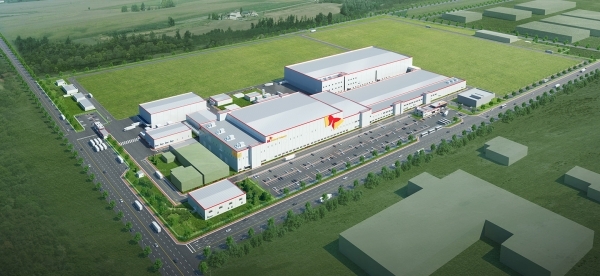Utilizing the experience in mass production line at Seosan factory

SK Innovation will operate the Hungary Komárom factory as a next-generation EV battery production line. The company plans to secure early orders from its European strategic customers with the battery with increased mileage per charge.
According to industry sources on the 8th, SK Innovation plans to produce only products using cathode material NCM811 (nickel, cobalt, and manganese ratio of 8: 1: 1) at the electric car battery factory in Komárom, Hungary being built currently. Mass production at the factory will begin in the first half of next year. The production volume is 7.5 GWh per year (GWh) and 250,000 electric cars. It is the world’s first NCM811 battery supply in a single factory. In the Seosan plant in Korea, NCM622 (nickel, cobalt, manganese ratio of 6: 2: 2) and NCM822 battery were produced in a mixed fashion.
A NCM811 battery is a key part of an electric car with a single charge mileage of over 500km. For mid- to large-sized batteries, the higher the nickel content, the higher the energy density, which increases the mileage. The mileage can be increased by more than 100 kms compared to the existing NCM622 battery. It is advantageous for cost reduction due to its decreased use of cobalt, an element with highly volatile prices. SK Innovation started mass production of NCM811 batteries at its Seosan plant in August 2017.
Energy density enhancement through lithium-ion battery separators (LiBS) is also a feature of batteries made at the Komárom factory. The "sequential stretching" method (lengthening the material left-to-right concurrently) has been combined to make the thickness uniform. LiBS acts to induce an electrochemical reaction by blocking the contact between the anode and the cathode. When the thickness of LiBS is reduced, it is possible to increase capacity by adding more negative and positive materials as the volume decreases.
SK Innovation succeeded in vertically integrating LiBS via its subsidiary SK Iris Technology. It tried to differentiate itself from LG Chem and Samsung SDI, both of whom receive their LiBS from Asahi Kasei, Toray and UBE Kosan. It will build a LiBS factory in Shilongsk, western Poland, the neighboring country of Hungary by investing 430 billion won. SK Innovation plans to start construction in the third quarter of this year with the goal of mass production by 2021.
In the industry, NCM811 batteries are expected to become a driving force for securing additional electric car orders from European strategic customer companies. China CATL, which forms the two-top structure with Panasonic in the global electric car battery market, has decided to produce only NCM811 batteries at its factory being built in Germany.

